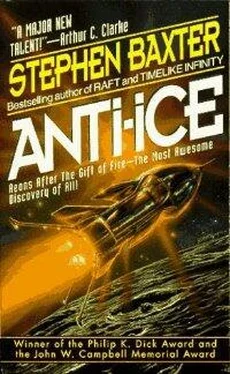Stephen Baxter - Anti-Ice
Здесь есть возможность читать онлайн «Stephen Baxter - Anti-Ice» весь текст электронной книги совершенно бесплатно (целиком полную версию без сокращений). В некоторых случаях можно слушать аудио, скачать через торрент в формате fb2 и присутствует краткое содержание. Год выпуска: 1993, ISBN: 1993, Издательство: Collins, Жанр: Фантастика и фэнтези, на английском языке. Описание произведения, (предисловие) а так же отзывы посетителей доступны на портале библиотеки ЛибКат.
- Название:Anti-Ice
- Автор:
- Издательство:Collins
- Жанр:
- Год:1993
- ISBN:978-0-246-13835-4
- Рейтинг книги:5 / 5. Голосов: 1
-
Избранное:Добавить в избранное
- Отзывы:
-
Ваша оценка:
- 100
- 1
- 2
- 3
- 4
- 5
Anti-Ice: краткое содержание, описание и аннотация
Предлагаем к чтению аннотацию, описание, краткое содержание или предисловие (зависит от того, что написал сам автор книги «Anti-Ice»). Если вы не нашли необходимую информацию о книге — напишите в комментариях, мы постараемся отыскать её.
Anti-Ice — читать онлайн бесплатно полную книгу (весь текст) целиком
Ниже представлен текст книги, разбитый по страницам. Система сохранения места последней прочитанной страницы, позволяет с удобством читать онлайн бесплатно книгу «Anti-Ice», без необходимости каждый раз заново искать на чём Вы остановились. Поставьте закладку, и сможете в любой момент перейти на страницу, на которой закончили чтение.
Интервал:
Закладка:
Holden snorted. “Yes. Would that he had been killed. In fact he emerged from his airlessness- induced torpor rather more rapidly than you.” He turned and pointed to the bunk folded out from the wall opposite me, and I made out a shapeless bundle of rather soiled blankets. “There the wretch still lies,” Holden said bitterly, “surviving in a ship he would have turned into an aluminum coffin for us all.”
Holden kept me company for a while, but then tiredness crept over me once more and, with apologies to the journalist, I had Pocket assist me to a prone position in my bunk and closed my eyes for some hours.
When I awoke the Smoking Cabin was empty, save for Pocket, myself—and the shapeless bundle in the far bunk. I asked Pocket for some tea; then, refreshed, I emerged from my bunk. After so long in bed I feared that my legs would buckle under me, and had we been on Earth perhaps they would have; but here in the comfortable floating conditions of space I felt as strong as I had ever done, and I pulled my way confidently across the Cabin.
I hovered over Bourne. The Frenchman lay facing the wall—I could see his eyes were open—and when my shadow touched him he turned and stared up at me. He was scarcely recognizable as Françoise Michelet’s haughty, even arrogant companion of a few days earlier. His face, always thin, had been reduced to the skeletal—his cheekbones jutted like shelves—and his lower chin was coated with a tangle of unruly beard. The remains of his masher’s costume—the red jacket and checked waistcoat—were now stained and crumpled, their gaudy colors only adding to the fellow’s pathetic aspect.
We stared at each other for several seconds. Then he said, “I suppose now you will finish the job you started, Monsieur Vicars.”
“What do you mean?”
“That you intend to kill me.” He said this quite without emotion, as one will describe the state of the weather, and continued to regard me.
I frowned and probed at my feelings. Here, I reminded myself, was a man who had stolen Traveller’s prototype craft; who had imprisoned myself and my three companions and hurled us into interplanetary space, quite probably to our deaths; who had directly caused the deaths of many innocent spectators at the launch of the Phaeton; and who had, no doubt, also been implicated in the plot to sabotage the Prince Albert itself, thereby taking the lives of perhaps hundreds more—including, possibly, that of Françoise Michelet, the girl on whom my foolish heart had fastened. I said quietly, “I have every reason to kill you. I have every reason to hate you.”
He regarded me quite without fear. “And do you?”
I looked within my heart, and at Bourne’s thin, suffering face. “I don’t know,” I said honestly. “I need to think about it.”
He nodded. “Well,” he said drily, “I suspect your companion does not share your calmness.
“Which one? Traveller?”
“The engineer? No. The other; the fat one.”
“Holden? He has threatened you?”
Bourne laughed and turned his face to the wall; when next he spoke his voice was muffled. “Since the engineer restrained him from strangling me in my weakened condition your Monsieur Holden has decided to starve me to death; or perhaps to dry me out like a leaf in autumn.”
“What do you mean?” I turned to the manservant, who had been watching us circumspectly. “Pocket? Is this true?”
Pocket nodded, but tapped his thin nose. “He was already half-starved after all those days on the Bridge without food or water, sir. But I wasn’t going to let anybody starve to death; I’ve been feeding him scraps and leavings when no one’s looking.”
I felt a great relief that Holden’s systematic cruelty had been subverted. “Good for you, Pocket; you were quite right. What did Sir Josiah have to say about all this?”
Pocket shrugged philosophically. “After he calmed Mr. Holden down, the day when you did your great deed—well, sir, you know how Sir Josiah is. I expect he’s forgotten all about this Frenchie; he’s scarcely been down here since.”
I smiled. “That I can well imagine.”
“I did not ask for the charity of a servant,” Bourne said coldly.
“And charity you’re not receiving, my lad,” said Pocket. “But if you think I’m about to spend my last few days sharing a tin box with the body of a Frenchie you’ve another think coming.” He spoke sternly, but rather in the manner of a parent admonishing a child; and I realized then that there was no malice in any corner of this remarkable chap’s character.
I turned once more to the Frenchman. “Why, Bourne?”
He twisted his head, his face distorted by the movement. “Why what?”
“Why did you steal this craft, cause so much damage and suffering?”
He turned his head away without reply.
With a strength that surprised me I grabbed his shoulder and twisted him around. “I think you owe me an answer,” I hissed at him.
“There is no point. You British would never understand.”
I pressed my lips together, suppressing my anger. “Tell me anyway.”
“Because of the tricolore,” he snapped. “The tricolore!”
He twisted out of my grasp and, no matter how I persisted, refused to say any more.
I found, to my horror, that Bourne had been held in restraints improvised from trouser-belts and fragments of air-hose; at my insistence—and on the proviso that he remain in his couch, and that one of us watch him at all times—the next day he was released and sat up gingerly, rubbing at wrists and ankles which were quite blue.
Feeling stronger, I climbed, with Holden, up through the ceiling hatchway.
When I had forced entry to the Bridge several days earlier my impressions had been blurred and fragmentary, after the manner of a nightmare; now, though, I saw that the place in flight was a basin of mechanical marvels. Devices whirred and clicked incessantly, so that one had the impression of a veritable artificial mind conducting operations aboard the craft; and the whole was lidded over by the glass latticework of the Phaeton’s nose. This dome now admitted a flood of silver light from a Moon which hung huge—ominously huge—at the crown of the ship.
“Ah, Wickers!” The voice boomed from somewhere above me; I turned and made out, in sharp moonlight shadows, the great throne fastened against one wall of the chamber. The throne, which was of purple, plumply stuffed damask finished with ropes of velvet, loomed over the Bridge like the couch of a Caesar. Traveller settled back in this throne; he sat with feet up, a loose restraint about his waist, lacking only a servant girl peeling grapes to complete the picture of the potentate at ease. “Rather an easier entry to the Bridge than last time, eh?”
“Indeed.”
I pushed off from the deck and floated up into the glass-lined dome, grasped one white-painted strut and hovered there, quite comfortably. Holden stayed close to the deck, among the clusters of instruments. From my new vantage point I saw how a pair of levers, connected to pivots fixed to the adjacent wall, were fixed to either side of Traveller’s couch; to the top of each lever was affixed a smaller steel handle which could be squeezed by the pilot’s fist. Later I was to learn how the smaller handles controlled the thrust of the Phaeton’s rockets while the levers themselves directed the swivelling of the nozzles, so steering the ship through space.
This couch, no doubt, was where the wretched Bourne had sat on a hot August afternoon, his forehead slick with a terrified sweat, in order to rip the craft from Earth.
Above Traveller’s head was suspended a long, black-painted tube which terminated in an angled eyepiece. I saw how this device could be pushed through seals beyond the hull, affording the pilot a wide angle of vision. Thus, thanks to this periscope and the optical glass of the dome, Traveller had a panoramic view of the universe beyond the walls of his ship—as well as of the metal landscape formed by his banks of devices. The centerpiece of this array of instruments was a table-like affair I recalled from my earlier visit, a wooden disc five feet across with a circular map inlaid in its center. Smaller instruments were gathered around this table, the dial-face of each illuminated by a small, steady light; the lights formed little yellow islands of illumination in a sea of moonshadow darkness. These dials, I saw now, were turned to face the throne (as I thought of it); the intention was clearly to allow the pilot from his couch to form an instant assessment of the state of the Phaeton —but the effect was rather of a crowd of mechanical pilgrims, each bearing a steady candle before his chest, faces turned in supplication to their lord.
Читать дальшеИнтервал:
Закладка:
Похожие книги на «Anti-Ice»
Представляем Вашему вниманию похожие книги на «Anti-Ice» списком для выбора. Мы отобрали схожую по названию и смыслу литературу в надежде предоставить читателям больше вариантов отыскать новые, интересные, ещё непрочитанные произведения.
Обсуждение, отзывы о книге «Anti-Ice» и просто собственные мнения читателей. Оставьте ваши комментарии, напишите, что Вы думаете о произведении, его смысле или главных героях. Укажите что конкретно понравилось, а что нет, и почему Вы так считаете.












